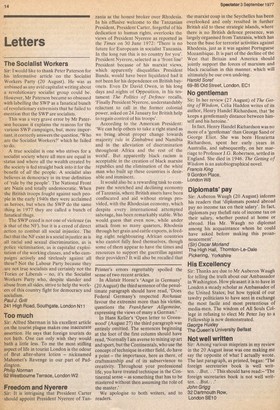Freedom and Nyerere
Sir: It is intriguing that President Carter should appoint President Nyerere of Tan Printer's errors regrettably spoiled the sense of two recent articles.
In Alistair Home's 'Angst in Germany' (20 August) the third sentence of the penultimate paragraph should have read, 'Does Federal Germany's respected Rechstaat favour the extremist more than his victim, questions the Frankfurter Allgemeine, expressing the views of many a German.'
In Hans Keller's 'Open letter to Greenwood' (August 27) the third paragraph was entirely omitted. The sentences beginning at the foot of the first column should have read, 'Normally I am averse to mixing up art and sport, but the Continentals, who use the concept of technique in either field, do have a point — the importance, here as there, of craftsmanship and of its subservience to creativity. Throughout your professional life, you have treated technique in the Continental sense — as something that has to be mastered without then assuming the role of the master.'
We apologise to both writers, and to readers. zania as the honest broker over Rhodesia. In his effusive welcome to the Tanzanian President, President Carter, forgetful of his dedication to human rights, overlooks the views of President Nyerere as reported in the Times on 30 June 1972: 'There is no future for Europeans in socialist Tanzania. In the long run this is no country for you'. President Nyerere, selected as a 'front line' President because of his marxist views, which apparently disqualifies President Banda, would have been liquidated had it not been for his dependence on British bayonets. Even Dr David Owen, in his long days and nights of Opposition, in his testament The Politics of Defence recalls, 'Finally President Nyerere, understandably reluctant to call in the former colonial power, asked on 24 January for British help to regain control of his troops'.
According to the American President: 'We can help others to take a right stand as we bring about proper change towards majority rule in Zimbabwe and Namibia and in the alleviation of discrimination throughout Africa and the rest of the world'. But apparently black racism is acceptable in the creation of black marxist republics and the elimination of the whit man who built up these countries is deskable and imminent.
It would also be a rewarding task to compare the wretched and declining economy of Tanzania, where British assets have been confiscated and aid without strings provided, with the Rhodesian economy, which despite every international attempted sabotage, has been remarkably stable. Who would guess that even now, while under attack from so many quarters, Rhodesia through her grain and cattle exports, is feeding eight neighbouring African countries who cannot fully feed themselves, though some of them appear to have the times and resources to support the guerrillas against their providers? It will also be recalled that the marxist coup in the Seychelles has been overlooked and only resulted in further British aid to these strategic islands, where there is no British defence presence, was largely organised from Tanzania, which has been the base for terrorist activities against Rhodesia, just as it was against Portuguese Mozambique. It is part of the decline of the West that Britain and America should jointly support the forces of rnarxism and black racialism in this manner, which will ultimately be our own undoing.
Harold Soref 69-85 Old Street, London, Ed1






























 Previous page
Previous page